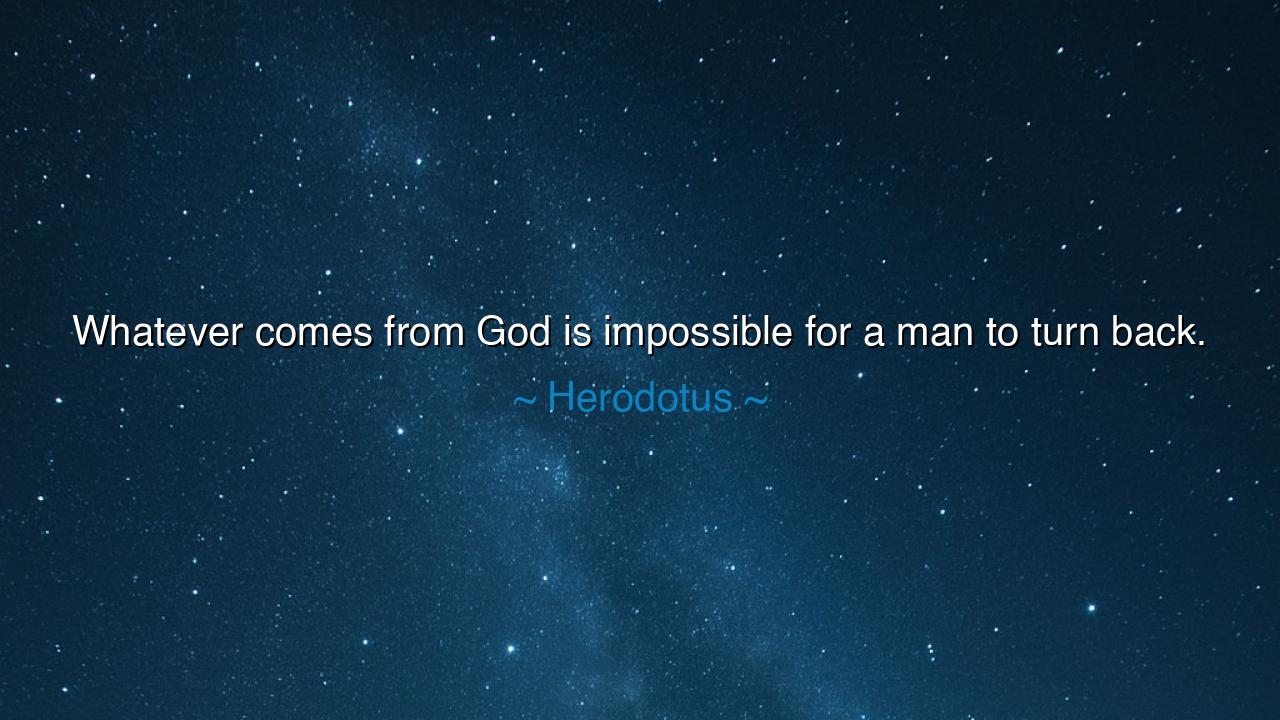
Whatever comes from God is impossible for a man to turn back.






"Whatever comes from God is impossible for a man to turn back." — These words from the ancient historian Herodotus carry the weight of divine truth and human limitation. In these few words, Herodotus speaks not just of fate, but of the sovereignty of the divine will over human actions. The understanding is clear: that which originates from the Divine cannot be reversed by mere human effort. The gods, in their wisdom and power, set into motion the course of the universe, and no mortal, no matter how mighty, can alter the path they have ordained. This is a deep and humbling truth — that there are forces greater than ourselves, forces that we cannot comprehend, and against which our own will is insignificant.
In the ancient world, this truth was expressed again and again through the myths and teachings that revered the gods as supreme over all human affairs. The Greek gods, though often capricious, were understood to be the masters of fate, guiding the lives of men with their will. The oracle of Delphi, where the god Apollo spoke through his priestess, was seen as a place where human effort could not change what was divinely destined. The ancient heroes, too, like Achilles or Odysseus, were caught in webs of destiny, their lives intertwined with forces beyond their control. To fight against God’s will was to invite ruin, for the divine had set the course, and no man could turn back what was ordained.
Consider the tale of King Croesus of Lydia, whose wealth and power made him one of the most formidable rulers of his time. When he consulted the Oracle of Delphi before going to war with Persia, he was told that if he attacked, he would destroy a great empire. Confident in his own strength, Croesus attacked, only to find that the empire he destroyed was his own. This tragic turn of events is a clear illustration of the ancient belief that no matter how powerful a man may be, the divine will cannot be thwarted. Croesus’ story speaks directly to the wisdom of Herodotus: that which is decreed by God cannot be undone by human effort, no matter how mighty the human hand that seeks to control it.
The ancient Greeks, especially philosophers like Heraclitus, understood the world as a place where change and order were governed by forces beyond human understanding. Heraclitus, who famously said, "You cannot step into the same river twice," recognized that life and nature are governed by divine principles that cannot be manipulated by human desire. Similarly, Herodotus saw the vast unfolding of history not as something controlled by kings or warriors, but as something guided by the will of the gods. The rise and fall of empires, the shifting tides of history, all follow a course that man cannot alter, no matter how hard he struggles.
The lesson in Herodotus’ quote is one of humility and acceptance. The divine will, or the plan that God has for the world, cannot be disrupted by human arrogance. To understand that we are part of a greater design is to live with the wisdom that not everything is under our control. There is a beauty in this surrender — an understanding that, while we have the power to make choices, there are also forces that move us beyond our understanding. It is through acceptance of this divine order that we find peace, knowing that we are part of something much larger than ourselves.
Take, for instance, the example of Mahatma Gandhi, whose work in India was built not upon a desire for personal power, but on a deep belief in the rightful will of the people, and in God’s plan for justice and freedom. Gandhi understood that no matter the obstacles in his path, there were forces at play that could not be hindered by human oppression. His humility and unwavering faith in a divine purpose guided him, even when the world seemed determined to block his progress. Gandhi’s life was a testament to Herodotus’ wisdom: that the divine will — for justice, for freedom — could not be turned back by human suffering or tyranny.
In our own lives, we must reflect on the truth that not all things are within our control. There are moments when we must surrender to the unseen forces at play, recognizing that some things are not meant to be altered by our will. It is in acceptance of the divine order that we find the strength to navigate the uncertainties of life. The chaos of the world may be overwhelming, but when we trust in God’s plan, we find peace amidst the storm.
Thus, Herodotus' words call us to humility and trust. Let us labor with faith, but not in the belief that we control all outcomes. Let us work diligently, but also understand that some things are beyond us, and that God’s will is the ultimate force guiding the world. Like the great empires of the past, we too are part of a greater story — a story that unfolds according to the divine will. And when we accept this, we are able to live with a deeper sense of purpose, peace, and alignment with the truth that God’s work is far greater than our own.






AAdministratorAdministrator
Welcome, honored guests. Please leave a comment, we will respond soon